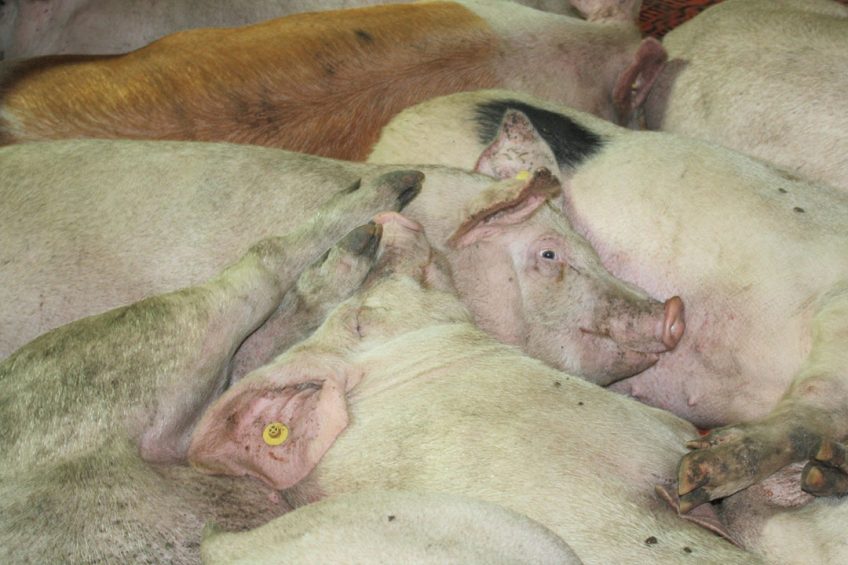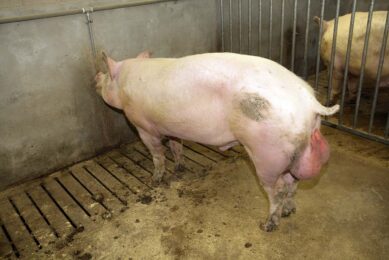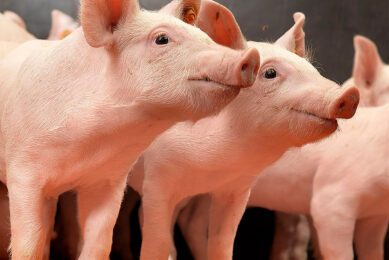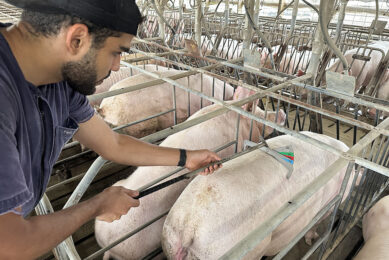How to deal with finisher pigs in overstocked pens?

Covid-19 has been causing a shortage of capacity in slaughter plants in the United States, which in turn leads to fuller pig houses than normal. With chaos looming, health and welfare expert Dr Monique Pairis-Garcia presents some do’s and dont’s on what pork producers can do to relieve the stress in crowded pig houses.
As we all continue to adjust to the new normal of our lives, the US swine industry is facing yet another challenge in moving pigs to slaughter. Given the increased number of Covid-19 cases amongst personnel working at processing facilities across the US, producers are working on adapting schedules to maintain finisher pigs on farm for longer. Given these circumstances, this article will address specific welfare issues to consider when working with heavy finisher pigs.
Quiet and gentle pig handling
Quiet and gentle handling of heavy finisher pigs is critical for both the welfare of the pig and the safety of those working with these animals. As pen space decreases and pig weight increases, appropriate, quiet and gentle handling must be implemented to prevent injuries and decrease excitement and stress within the group.
When pigs need to be moved, appropriate handling devices such as sort boards or v-boards should be used with pigs at this size to protect workers from injury and create a visual barrier to encourage the pig to move in the proper direction. Hot shots or prods should be not used in the pen at any time and be limited to circumstances for loading pigs onto a truck as minimally as possible.
Unwanted behaviour like tail biting
One of the greatest challenges that we face from a behavioural standpoint with heavy finisher pigs is abnormal vices, particularly tail biting. Tail biting is abnormal behaviour most commonly occurring in the finisher phase of production. There are several concepts behind why the behaviour is performed and what the benefit is to the pig.
The most common thoughts behind this behaviour is that this is redirected behaviour, defined as a normal behaviour pattern which is misdirected due to a lack of proper environmental stimulation. Tail biting significantly impacts the welfare and productivity of the pigs and results in slow growth, carcass devaluation, increased costs to the producer and pain experienced by the tail bitten pig.
Enrichment items
Given heavy pigs will likely remain in the pen for longer, producers can improve environmental complexity of the pen with the hopes to redirect biting behaviour onto environmental enrichment. Enrichment items should have the following characteristics:
- Item can be manipulated and chewed on by pig;
- Item can be destroyed; and
- Item can eventually consumed.

Pig Progress experts talk
To read more Pig Progress expert opinions
Stocking density issues
Losing pen space can be one of the most challenging and difficult factors to control when maintaining heavy finisher pigs. Most finisher pigs are provided with 6ft2/pig (0.56 m2) in the US. Lack of space can result in an increase in aggressive behaviours as pigs compete for critical resources (i.e. lying space, feed, water, etc.).
Producers should focus on identifying compromised pigs that do not have the weight or ability to compete with pen mates and remove them to hospital or recovery pens. Identifying poor-doing animals earlier on will not only help in freeing up pen space but will also provide additional resources and reduced competition for pigs that may have underlying challenges or disease.
The next weeks of planning will be challenging. Swine producers must take into account ways to ensure good animal welfare as plans are sorted to find avenues for processing these animals in such an unprecedented time.
 Beheer
Beheer








 WP Admin
WP Admin  Bewerk bericht
Bewerk bericht